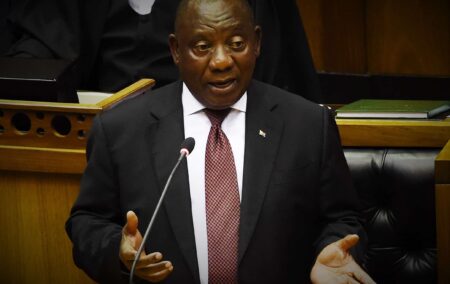Last Tuesday, Business Day rang in the shortened work week with a scathing editorial about the state of South Africa and the complicity of President Cyril Ramaphosa in its decline. Entitled ‘ANC happy with a puppet president’, it said that he was not capable of making hard decisions and has shown himself unable to challenge his own party or to show effective leadership. Hence the country’s current malaise and the lack of any prospect of setting it back on track.
There is no mistaking the sense of disappointment it expresses. There were high hopes for President Ramaphosa as the antidote to the Zuma ascendency. He was seen as a constitutionalist and a businessman who had the instincts to steer South Africa towards something resembling capable governance and economic growth. A tall order by any standards, but one for which he was seen as the country’s best bet.
This overlooked a great deal: most obviously, President Ramaphosa had acted as Zuma’s lieutenant for much of the state capture period. He had chaired the ANC’s cadre deployment committee, which had been a key machine of state capture, not just after the Gupta family got its hooks in, but since the party had decided in the 1990s to capture the state for itself. It’s difficult to point to much evidence that prior to assuming the presidency, Mr Ramaphosa had felt any significant disagreements with the direction of economic policy.
And as President, not only has he failed to make much headway in turning the country around, but some of the signature policy positions his government has taken could hardly have been less propitious for a turnaround had they deliberately been so designed. Indeed, President Ramaphosa began his presidency by pushing the Expropriation without Compensation agenda, a disincentive to any investor and a particular concern to the farming community.
Vigorously pushed
He has also vigorously pushed for a National Health Insurance system, something that would have vast – and vastly unwelcome – ramifications for private firms in the health sector, and which assumes a highly capable and professionally managed state. This just doesn’t exist, not in general and not in the health sector. The feeding frenzy around Covid-19 relief funding – with its somewhat lethal consequences – tells us everything the country needs to know about the state of play.
And most recently, President Ramaphosa signed into law amendments to the Employment Equity Act that create the space for ministerially determined quotas, along with crippling fines to punish those firms that fail to comply.
Meanwhile, despite the voluminous evidence of the Zondo Commission and its damning indictment of cadre deployment, the President himself has stubbornly defended it. Indeed, he’s shown more ‘leadership’ over this than on most other things. And he’s done so with no hint of irony, even as he proclaims the need for a ‘capable state’.
Of course, in this, President Ramaphosa is reflecting the position of his party. And as the editorial notes, South Africa’s political system gives an inordinate amount of power to political parties.
It’s an interesting situation. Parties are the only vehicles for our representative politics (some seats in municipalities excepted). And while the office of the President is a constitutional one, it is mediated by parties. South African politics has put a lot of emphasis on the charisma of leaders – whether Nelson Mandela, FW de Klerk, Tony Leon, or Jacob Zuma, Julius Malema, Helen Zille, or indeed Cyril Ramaphosa – but their ascendancy is largely beyond the influence of most people. Executive power is formally accountable to the legislative branch. But since the latter is constituted through parties, it is here that the decisive (though technically informal) influence – call this the real system of accountability – will be exercised.
Less abstract
Leaders, though, are more identifiable and less abstract than political parties. In moments of profound stress and crisis, there is a natural tendency to seek the reassurance of an individual. A leader can provide the appearance of resolution and the promise of action; it’s easy to forget that bringing this about is not merely a matter of personal will and commitment. Leaders operate within systems with incentive structures, which are complex matters to manage.
This is not to say that leadership is unimportant. A good leader can work within systems as they exist to pursue their goals.
South Africa’s problem is twofold. The leadership, such as it is, that the President has provided has been deficient, at least in the sense that he has no evident commitment to the reorientation of policy that the country requires. But the manner in which South Africa’s politics is structured makes it very difficult to exercise leadership effectively in the service of the country.
This is one reason why South Africa needs fundamental electoral reform (and not the malicious compliance that recent amendments have tried to introduce). The goal is not just direct representation, but reorienting the accountability incentives in the relationships between people and their representatives so that they are not entirely subservient to the interests of political parties.
But this will not be a complete solution. It is past time that South Africa’s political elites – and none more so here than the ANC – shifted their attitudes about the place of party machines within the country’s political life. Important, certainly, but not all-encompassing. They need to comport themselves with more than their own interests in mind. Their representatives need to bear this in mind too. At present, party interests have been allowed to overwhelm national ones.
South Africa will need to get these things right before the full benefits of good political leadership can come to fruition.
If you like what you have just read, support the Daily Friend


